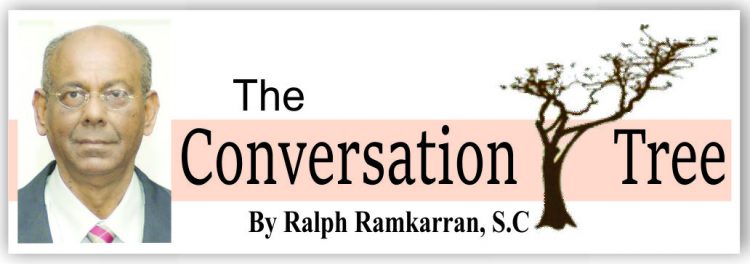
There is something about the legal profession that captures the imagination of the public that no other profession does. The great names in engineering, medicine, accountancy and academics are not as well-known as those of the legendary JOF Haynes, Fred Wills, Stanley Hardyal, Mohamed Shahabuddeen and others. The great judges of the era of Chase, McKay and King are also noted personalities. Names such as Harold Bollers, Victor Crane, Akbar Khan, Guya Persaud, Kenneth George, Keith Massiah, and so many others were widely known. These lawyers and judges were around in the days when a crowd regularly gathered daily under a tree on the south-western corner of Croal Street and Avenue of the Republic discussing, arguing about the legal and factual circumstances of cases being heard – usually criminal cases, and vigorously giving their views. Views on no case submissions were hotly debated. It was also a time when the newspapers printed the names and exploits of the lawyers appearing in the cases. The names above and others were household names.
A lot has been said and published about Ashton Chase but apart from an announcement of his passing in the newspapers, nothing has been mentioned about Joseph King, better known as Joey King. His grandparents migrated to British Guiana so he was one of the few surviving Guyanese who could have claimed direct English lineage. He was proud of it, spent long periods every year in the UK. But he remained in Guyana while his entire family migrated. He attended St. Stanislaus, was proud of being a runner-up for the Guyana Scholarship and was deeply engaged in Guyana’s history and culture. He had a fully stocked library of novels written by Guyanese from the earliest days, and of Guyana rum and, was an active member and vice president of the Heritage Society. He was a director of the early legal aid effort in the early 1970s with his closest friends in the legal profession, Miles Fitzpatrick and David de Caires. He became a Senior Counsel in 1975 and was an Acting High Court Judge.
He became a popularly known figure from the early 1970s when the sport of motor racing arrived in Guyana and the exploits of drivers seized the public imagination. For a period, he was a champion racing driver and his performances on the racetrack became well-known. He was a member of the rowing club. As a tall, handsome and lifelong bachelor, with a convivial personality, there were benefits other than fame from his sporting exploits. Joey retired from active practice about twenty years ago. He became ill about two years ago but retained a sharp intellect, enough to direct that he wanted a private funeral and a modest gathering of friends at the Guyana Motor Racing Club, with no speeches. The gathering took place on Friday evening and, contrary to his wishes, there were reminiscences. Joey King had political views but had no appetite for active politics and was not directly engaged in any political activity or political cases. His numerous, significant, reported cases, over thirty, were of a commercial nature and vastly contributed to legal learning in Guyana. He was senior partner of Cameron & Shepherd from 1972 to 2006. Because he stopped appearing in court about thirty years ago, he is not known by the current generation of lawyers or judges.
Apart from the other great names in the profession in recent times such as the late Lloyd Luckhoo, Clarence Hughes and Derek Jagan, against all of whom I appeared with differing degrees of regularity, there were the colourful characters such as Fred Wills, who Joey King referred to as a ‘genius.’ There was the late Krishna Prasad of Berbice. He was a brilliant lawyer, with a good memory, who prepared his cases at daybreak. By the time he appeared in court, with no files, notes, paper or pen, he was intoxicated, but with speech intact, though slightly slurred. At the end of his case, he would make well-prepared submissions and secure the dismissal of his client’s case. He gained the reputation of being unable to win a case unless he was drunk. Krishna Prasad was a brilliant lawyer who successfully defeated his addiction, continued to be a brilliant lawyer, carrying a briefcase with files, and eventually migrated.
(This column is reproduced with
permission from Ralph Ramkarran’s blog, www.conversationstree.gy)





